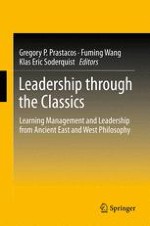2012 | OriginalPaper | Buchkapitel
32. How Managers Make Sense of CSR: The Impact of Eastern Philosophy in Japanese Owned Transnational Corporations
verfasst von : Sharon Jackson
Erschienen in: Leadership through the Classics
Verlag: Springer Berlin Heidelberg
Aktivieren Sie unsere intelligente Suche, um passende Fachinhalte oder Patente zu finden.
Wählen Sie Textabschnitte aus um mit Künstlicher Intelligenz passenden Patente zu finden. powered by
Markieren Sie Textabschnitte, um KI-gestützt weitere passende Inhalte zu finden. powered by
